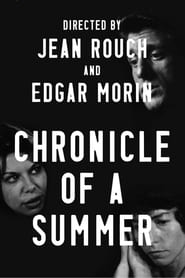
In 1961 anthropologist Jean Rouch and sociologist Edgar Morin developed a sociological experiment with film that strove to prove truth can be reached through an ever present camera lens. They used a simple 16mm camera to interview and follow certain regular people in Paris. The film begins with each subject asked the simple question as to whether he or she is happy. From the inconclusive responses their camera follows and then interviews each one. Then they film their reaction to watching the interviews in a screening and film an interview in order to get the subjects response to what they saw. The film then concludes with the two scientists/filmmakers stating their opinion on whether or not they reached their goal in filming the truth. This was an innovative film that has served as the inspiration to some of the greatest documentaries. Films such as, “Shoah” and “Hotel Terminus” used the techniques invented in this movie. They proved in the film that shoving a camera in front of the face of a person may actually result in all inhibitions leaving the interviewee. The art is in the interviewer knowing how to ask the questions and pushing the correct buttons. The movie needs to be commended for inventing this style of cinema documentary called, Cinema Verite (truthful Cinema), whereby the subject and audience are actually aware of the camera. Nothing is hidden and the result may be actually eye opening. The movie itself is actually not about anything interesting as the people being studied are not very interesting or involved in anything conflicting. Watching it subjected me to one and a half hours of insipid conversations with people living their ordinary drab lives. It was a struggle to watch the entire film as it is cheaply made and very boring. After all this is more of an experiment, then a movie and viewers should be warned.


Oh wow you missed the point of those “insipid conversations” and “ordinary drab lives” in a spectacular way my friend
LikeLike
Very possible. It was a hard watch
LikeLike